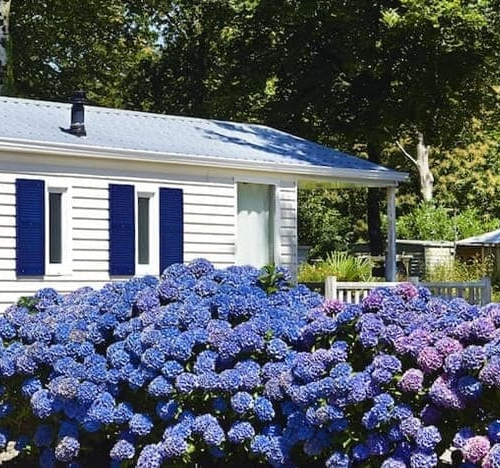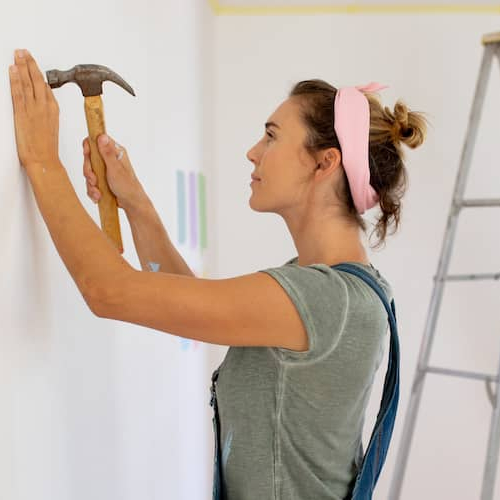How to choose the best modular home manufacturer
Contributed by Sarah Henseler
Dec 1, 2025
•6-minute read
Choosing to purchase a modular home is a big decision, and so is choosing the right manufacturer. With so much interest in modular homes, it’s no wonder more and more companies have entered the market to meet demand. But how do you find the right manufacturer for you?
Let us help. Our research has come up with six impressive modular home manufacturers that each excel in different ways. Some offer affordability, others customization, but all of them provide what could be your next permanent residence.
Disclosure: None of the companies on this list have provided compensation for review or appearance on this list. All opinions are our own.
Clayton Homes
Clayton Homes offers homes quickly at a relatively low cost. Their work has won them multiple Excellence in Manufactured Housing Awards from the Manufactured Housing Institute (MHI).
Pros
- Budget-friendly: Clayton Homes offers homes starting at around $60 per square foot.
- Short construction times: With a reputation for fast builds, you could see your home’s final touches completed in as little as 8 weeks.
Cons
- Home style availability: Not all home styles are available depending on your location.
- Basic warranty: Purchases only come with a basic warranty. You’ll have to upgrade if you want further coverage.
Champion Homes
Champion Homes offers customizable floor plans and has seen its fair share of MHI awards –the company has built over 3 million homes since their founding in 1953.
Pros
- Virtual home tours: Champion Homes provides virtual tours to help you see your future home before you begin construction.
- Floor plan options: Make your modular home yours by choosing the house layout to fit your needs.
Cons
- Requires local retailer: In order to purchase through Champion Homes, you’ll need to find and work with a local retailer.
- Price transparency: It will be more difficult to gauge costs due to a lack of easily accessible online prices.
Impresa Modular
Customization options and nationwide reach make Impresa Modular a strong option for those looking for flexibility in a modular home manufacturer.
Pros
- Customization options: Impresa Modular is ready to work with your ideas for an ideal home setup.
- Reasonable construction times: With construction times averaging around 3 – 4 months, you can move into your new home relatively quickly.
Cons
- Higher price point: Averaging around $200 – $245 per square foot, these homes will weigh a bit heavier on your wallet. Request a quote online to see how their homes fit within your budget.
- Limited warranty: You may need to go the extra mile to get the extensive warranty you’re looking for.
Commodore Homes
You may want to consider Commodore Homes if you’re interested in their comprehensive budgeting calculator and live in one of the 35+ states covered by their services.
Pros
Extensive budgeting tool: You’ll see costs broken down by each construction component to ensure you’re getting your money’s worth.
Online design tools: On the Commodore Homes website, you can design each feature of your future home with the click of a button.
Cons
- Limited geographic availability: While they offer modular home construction in over 35 states, that limited range may put you out of luck.
- Opaque pricing: Average home costs aren’t readily available online, so it’s difficult to say if these homes will fit your budget without further inquiry.
Deer Valley Homebuilders
Operating primarily in the South, Deer Valley Homebuilders offer energy-efficient homes that combine high-quality materials and rustic charm.
Pros
- Energy-efficient: If saving on utility bills and helping the environment sound good, you may appreciate Deer Valley Homebuilders emphasis on reducing your energy usage.
- Rustic charm: Their customizable floor plans have a unique blend of country and modern designs.
Cons
- Limited geographic availability: You’ll only find Deer Valley Homebuilders in 20 states located primarily in the Southern United States.
- Price transparency: It’ll be difficult to compare their price offerings to others due to a lack of online pricing structures.
Blu Homes
Blu Homes provides a more boutique experience in California, offering eight customizable house models ranging from $155K - $665K.
Pros
- Substantial warranty: You can expect a 10-year structural warranty, a 2-year systems warranty, and a 1-year workmanship warranty with your purchase.
- Modern aesthetic: Blu Homes designs have a clean, contemporary design elements, a fitting match for the California landscape.
Cons
- Available in California only: This modular home manufacturer has the most limited range on our list, providing homes only within California.
- Relatively expensive: Many Blu Homes models cost up to $250 or more per square foot, which may stretch your budget more than you’d like.
9 tips to help you choose a modular home builder
1. Floor plans
The floor plan is first on this list because it’s the first thing you should consider when deciding on a modular home manufacturer. The layout of the rooms, the size of the building, and the overall feel of the home are determined by the floor plan, so you'll want to go with a manufacturer that offers one you're excited to live in.
2. Customization
Do you like the floor plan but you don’t love it quite yet? Modular home manufacturers offer customization options to turn “just off” to “just right.” Start with a list of features you want in a home and see if the manufacturer’s website has a 3D customization tool that lets you see these features in action. You should also talk with the builder directly to collaborate on your vision.
3. Reviews
Before you sign a contract, always look up reviews from local customers who had their homes built by your chosen manufacturer. Learn about any mishaps or headaches they experienced, like unmet promises and faulty construction.
4. Customer service
Building a modular home is an involved process, and you may end up dealing with the manufacturer’s customer service on more than one occasion. Ensure their customer service hours align with your availability and that they’re responsive to customer needs.
5. Delivery time
Delivery estimates on a manufacturer’s website won’t always align with the reality of your construction situation. This could be due to the complexity of your customizations, location of the home, or the seasonal demand for homes. Speak with the builder about your unique situation to get the most accurate estimate.
6. Construction materials
Along with the layout of the home, you should consider the materials used for construction. A cheaper build may sound great for your budget, but opting for pricier materials could mean fewer repairs and more savings on energy costs. Talk with your builder about these concerns and see what alternative materials they offer.
7. Warranties
Even though modular homes come straight from the factory, they can still arrive with imperfections that lead to costly repairs. A warranty will protect you in case anything breaks down unexpectedly. Usually you’ll see a 1-year warranty offered, but you may want to ask the manufacturer about extended warranties for future peace of mind.
8. Budget
Remember that the cost listed on the website won’t be the final bill. Customization increases the expense of the house, and you still have site preparation, utilities, taxes, and fees to cover. It’s always better to overestimate your budget rather than underestimate.
9. Availability
You found the perfect floor plan, the right customization, it’s all within your budget — and the manufacturer doesn’t build in your area. That’s the unfortunate reality for many. Always check a manufacturer’s geographic availability before getting your hopes up.
FAQ
What’s the difference between manufactured home builders and modular home builders?
A modular home involves multiple factory-made pieces that are assembled on a home site. A key feature of modular homes is their structure, which is permanently attached to the land by way of a traditional foundation.
On the other hand, manufactured homes are built in sections on a steel chassis – which may not be affixed to the land – for a single or multi-width space. Manufactured home builders provide homes with the ability to move. They must meet building codes set by the Department of Housing and Urban Development (HUD).
Do modular home builders have to follow state building codes?
Yes. Modular homes must follow state, local, and/or regional building codes and are held to the same standard as site-built homes.
Are modular homes more expensive than manufactured homes?
It is often the case that modular homes are more expensive than manufactured homes. This is because manufactured homes are largely built in the factory and shipped, reducing construction and labor costs. However, modular homes tend to appreciate more in value over time.
Is working with a modular home builder better than buying a manufactured home?
It all comes down to what you want in a home. A modular home will give you a long-lasting residence that appreciates in value, while a manufactured home will offer a less expensive upfront cost to home ownership.
The bottom line: Find the best modular home builder for you
A modular home offers a unique blend of predesigned floor plans and customization options to give you a budget-friendly residence you can love. Modular home manufacturers each have their pros and cons, and now you have a better understanding of what they offer. Thoroughly consider your lifestyle and financial needs, and you’re bound to find a builder you’re excited to work with and who’s excited to work with you.
Interested in financing a modular home? Start an application today with us at Rocket Mortgage®.

Michael Rosenthal
Michael Rosenthal brings over a decade's worth of experience writing for finance, tech, education, and entertainment. He earned his bachelor’s in writing and a certificate in public & professional writing from the University of Pittsburgh along with a master’s in television production from Boston University.
His previous work includes developing personal finance education for a Fortune 500 company and articles for various mortgage lenders. When he’s not writing for Rocket Mortgage, Michael spends his time fixing up his well-aged home in Los Angeles one leaky sprinkler at a ti
Related resources
6-minute read
Kit homes: What you should know before buying
Kit homes are mail-order homes delivered in parts and built right on your property. Explore the pros and cons of building one and how much it could cost you.
Read more

5-minute read
Manufactured and mobile home loan financing
Manufactured homes can be an affordable option as traditional home prices rise. Learn how to get a mobile home loan from Rocket Mortgage.
Read more

7-minute read
Cheapest ways to build a house: 12 tips for affordable home building
Building a home can be a viable option for buyers in a competitive market, but expenses can add up quickly. Discover the cheapest ways to build a house.
Read more